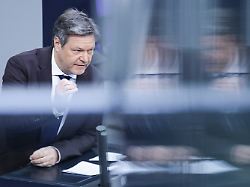In the debate about the budget of the Ministry of Economic Affairs, the opposition does not give Robert Habeck any kind credit. The Federal Minister of Economics nevertheless extends her hand – and invites people to talk about a new special fund that will benefit companies.
In the fight against recession, corporate exodus and the general poor mood in the German economy, Federal Economics Minister Robert Habeck has submitted a proposal to the Union for a debt-financed aid program. Reforming the debt brake is currently not an option, but: “What if we introduced a special fund to solve the structural problems,” asked Habeck during the Bundestag debate on his ministry’s budget for the current year. This could finance tax breaks and tax depreciation options for companies. He has in mind an “Economic Opportunities Act times ten, maybe times fifty.”
The Economic Opportunities Act, currently blocked by the Union in the Federal Council, is worth around 32 billion and is intended to support companies with investments, especially in converting to a climate-neutral economy. Seven billion euros of this are to be spent in the current year. A 50-fold volume meant taking on debt worth three-digit billions. In order to be able to raise these sums despite the debt brake on the financial market, the special fund would need a change to the Basic Law, which, in addition to the traffic light parties, the CDU and CSU in the Bundestag and Bundesrat would have to agree to. The government factions and the Union had already done this in 2022 when the 100 billion euro special fund to strengthen the Bundeswehr was decided. Critics always point out that special assets actually represent special debts.
Klöckner: Habeck failed
Habeck said that such an approach requires “a joint conversation, and I invite you to do so.” He pointed out that banks, various experts and the Council of Economic Experts, among others, had recently called for a reform of the debt brake in order to enable more investments. In a fire letter to Chancellor Olaf Scholz on Tuesday, the most important business associations called for a better investment climate, as well as significant deregulation and relief from taxes and social security contributions. A reform of the debt brake is failing because of the FDP, which had the coalition agreement stipulate that the status quo should be adhered to, and because of the Union. On Wednesday, CDU leader Friedrich Merz ruled out the Union parliamentary group’s approval of any changes for the current legislative period.
The economic policy spokeswoman for the Union faction, former Federal Agriculture Minister Julia Klöckner, had torn apart Habeck’s balance sheet before his speech. With a view to the shrinking of the economy by 0.3 percent in the fourth quarter of 2024, the growing number of relocating companies and falling production in Germany, Klöckner stated that “the politics and this theoretical approach of Federal Economics Minister Habeck have failed.” “Micromanagement coupled with a subsidy spiral” leads to a dead end, Klöckner said of the Green politician and denied him any affection for Germany as a business location. “He said back then that he found love of country and patriotism sick – unfortunately it shows.”
CDU economic politician Andreas Mattfeld had previously presented a taillight lantern at the podium, which he wanted to hand over to Habeck. It symbolizes that Germany is once again at the bottom economically. The Federal Minister for Economic Affairs and Climate Protection had “taken the wrong turn in terms of energy policy and economic policy,” said Mattfeld. “You completely ignore the fact that other nations don’t want to follow your path and are making us dangerous economic and political wrong-way drivers.”
Habeck criticizes Merz’s attitude towards traffic lights
Habeck countered Mattfeld by saying that the lamp was a petroleum-powered device from the 1950s. “A tail light as a symbol of the Union’s economic competence, an economic policy with petroleum,” mocked Habeck, who wants to make industry and consumers independent of fossil fuels in the medium term.
But Habeck took even greater aim at Union faction leader Merz and his speech during the general debate the day before. “‘We’re not discussing it with you,’ he said,” Habeck quoted the CDU leader as saying. But that is wrong. The Union will also need government partners one day, and he also works “excellently” with the Union’s prime ministers and economics ministers in the federal states. In addition, his ministry is piled up with letters from Union MPs “asking that we help you give subsidies to companies in your constituency – namely subsidies from programs that are currently making fun of you here.”
In his speech, Merz was, among other things, outraged that the traffic light factions had not supported a proposal from the Union. Furthermore, Chancellor Olaf Scholz’s Germany Pact on Migration was not meant seriously, complained Merz. At the Bundeswehr special fund, where the Union approached the traffic light, the traffic light also did not comply with the agreements made. He therefore categorically ruled out further cooperation for the remainder of the current legislative period.
